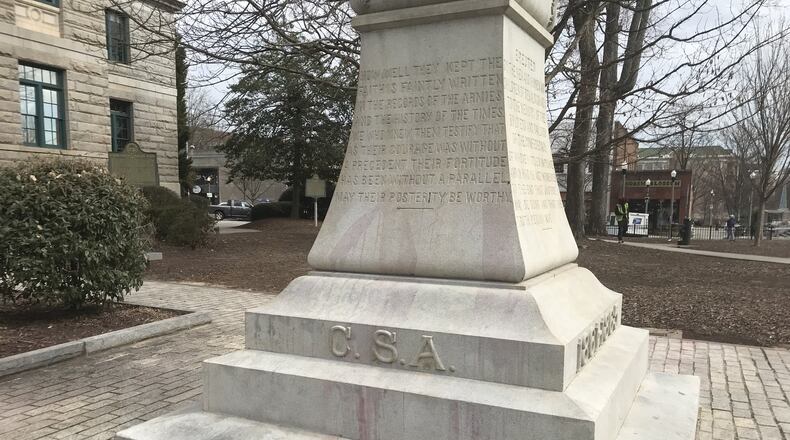Historians and Confederate enthusiasts offered opposing testimony Thursday on dueling bills that would regulate the way monuments and memorials are maintained in Georgia — but senators declined to make any decisions.
A Senate panel listened to supporters of two pieces of legislation that would either add protections for monuments or allow local governments to move Confederate markers.
The room was set up for a tense exchange, with several Capitol police officers standing outside the hearing room and one inside to ensure there were no issues. But supporters of either protecting or removing the monuments plainly stated their views without any drama.
Martin O’Toole, a spokesman with the Georgia Division of the Sons of Confederate Veterans, cited movements being made across the country where cities have chosen to remove monuments and markers.
“This bill would protect American monuments — historical monuments — and we would leave a legacy down to our children and grandchildren,” O’Toole said.
But Atlanta historian Keri Leigh Merritt said Confederate monuments often were erected years after the Civil War as a way to intimidate black residents under the guise of honoring soldiers.
“The Confederacy was created solely to serve the interests of the slave regime of the old South, and it needs to be historicized as such,” she said. “For African-Americans, its monuments serve as a constant reminder of an extremely painful past.”
For the past few years, DeKalb County has been the focus of local residents and officials seeking to remove Confederate markers.
County officials passed a resolution asking the state to allow them to remove a 30-foot-tall obelisk praising Confederate soldiers in downtown Decatur. Others have sought to remove the granite carving of three Confederate leaders from Stone Mountain.
But a 2001 state law protects any changes to the monuments.
Senate Government Oversight Chairman Bill Heath, a Bremen Republican, said senators would continue the discussion later on Senate Bill 77, which would require someone who vandalizes any monument to pay for the damage that is done. Currently, a judge determines whether a vandal who is caught and charged would have to pay for the repair or replacement of a monument.
The bill's sponsor, state Sen. Jeff Mullis, said the bill protects all monuments, not just those honoring the Confederacy.
“The purpose of this is to be a deterrent,” said Mullis, a Republican from Chickamauga. “It’s for the bad guys that are destroying these monuments to know they’re going to have to pay to repair them or replace them.”
On the other side, Senate Bill 51 would give local governments the ability to move Confederate monuments.
The bill's sponsor, Atlanta Democratic state Sen. Elena Parent, said the purpose of the legislation is to let local officials control the display and maintenance of Confederate monuments.
If the bill is approved, it would overturn a 2001 measure that redesigned Georgia’s segregation-era state flag but protected all Confederate monuments in the state.
“Instead of having a blanket mandate of Confederate monuments, local governments and communities should be able to make their own decisions,” Parent said.
Another bill aiming to remove Confederate monuments was recently introduced in the House. The measure, House Bill 175, would ban the use of public money or property to display Confederate monuments unless they're housed inside museums.
Bills trying to remove or give local governments the right to remove Confederate monuments have been filed in recent years, but they have gone nowhere in the General Assembly.
Stay on top of what’s happening in Georgia government and politics at ajc.com/news/georgia-government/.
About the Author
Keep Reading
The Latest
Featured




